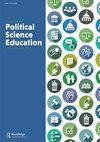让学生说话:在中国的国际研究课堂上使用播客来促进学生的声音和参与
IF 0.6
Q3 POLITICAL SCIENCE
引用次数: 1
摘要
本文章由计算机程序翻译,如有差异,请以英文原文为准。
Let the Students Speak: Using Podcasts to Promote Student Voice and Engagement in an International Studies Classroom in China
Abstract Active teaching and learning support pedagogies typically require student vocal participation in the classroom. However, very little is known about strategies used to promote student voice especially in teacher-dominated classroom cultures in many parts of the developing world. This paper reports action research that explored student responses and challenges to the use of student-produced audio podcasts in teaching a module focusing on Africa in a transnational university in China. Mixed methods involving a written questionnaire and mechanical reviews of student essays vindicate student podcasts as perceived valuable tools not only for promoting student voice but also for enhancing learning motivation and teaching-back misconceptions about Africa. Variation in accent, pace, audibility, and clarity of student podcasts posed a major challenge to comprehension of some podcasts and participation in podcast-based discussions. Based on students’ feedback, this study prescribes use of visual aids alongside audio podcasts to optimize the benefits of podcasting pedagogy in transnational education contexts.
求助全文
通过发布文献求助,成功后即可免费获取论文全文。
去求助
来源期刊

Journal of Political Science Education
POLITICAL SCIENCE-
CiteScore
1.80
自引率
36.40%
发文量
69
期刊介绍:
The Journal of Political Science Education is an intellectually rigorous, path-breaking, agenda-setting journal that publishes the highest quality scholarship on teaching and pedagogical issues in political science. The journal aims to represent the full range of questions, issues and approaches regarding political science education, including teaching-related issues, methods and techniques, learning/teaching activities and devices, educational assessment in political science, graduate education, and curriculum development. In particular, the journal''s Editors welcome studies that reflect the scholarship of teaching and learning, or works that would be informative and/or of practical use to the readers of the Journal of Political Science Education , and address topics in an empirical way, making use of the techniques that political scientists use in their own substantive research.
 求助内容:
求助内容: 应助结果提醒方式:
应助结果提醒方式:


